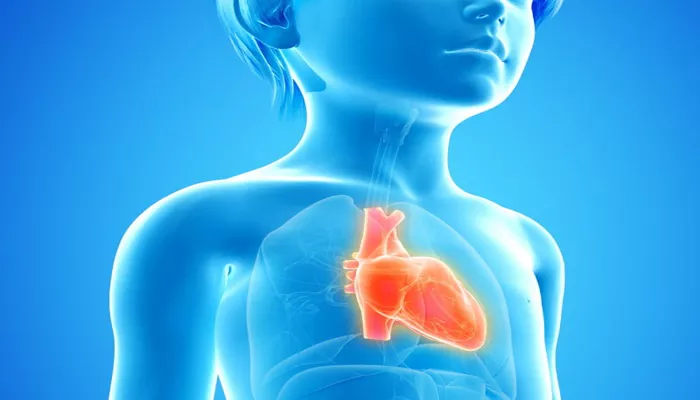Heart failure in infants and children is a serious medical condition that demands immediate attention and intervention.
Unlike in adults, where lifestyle factors often contribute to heart failure, in children, the causes are more likely to be congenital or related to genetic disorders. Understanding these causes is crucial for early diagnosis and effective treatment.
Here, we delve into the seven major causes of heart failure in infants and children.
1. Congenital Heart Defects
Congenital heart defects (CHDs) are structural problems with the heart present at birth. They are the most common cause of heart failure in infants. These defects can affect the heart walls, valves, and blood vessels, leading to impaired blood flow and heart function.
Types of Congenital Heart Defects
Septal Defects: These involve holes in the heart’s septum, the wall that separates the left and right sides of the heart. Common types include atrial septal defect (ASD) and ventricular septal defect (VSD).
Patent Ductus Arteriosus (PDA): This condition occurs when the ductus arteriosus, a blood vessel that bypasses lung circulation in the fetus, fails to close after birth.
Tetralogy of Fallot (TOF): A complex condition involving four heart defects that result in oxygen-poor blood being pumped to the body.
Coarctation of the Aorta: A narrowing of the aorta that forces the heart to pump harder to get blood through the artery.
Transposition of the Great Arteries (TGA): The positions of the pulmonary artery and the aorta are switched, leading to poor oxygenation of blood.
see also: How Does Aortic Regurgitation Cause Heart Failure?
Diagnosis and Treatment
Early diagnosis through prenatal ultrasounds and newborn screenings is critical. Treatment varies from medication to manage symptoms to surgical interventions to correct the defects.
2. Cardiomyopathy
Cardiomyopathy refers to diseases of the heart muscle. In children, the heart muscle becomes enlarged, thick, or rigid, affecting its ability to pump blood effectively.
Types of Cardiomyopathy
Dilated Cardiomyopathy: The heart chambers enlarge and weaken, leading to poor blood flow.
Hypertrophic Cardiomyopathy: The heart muscle thickens, which can obstruct blood flow and make it harder for the heart to pump blood.
Restrictive Cardiomyopathy: The heart muscle becomes rigid and less elastic, preventing the heart from filling with blood properly.
Causes and Treatment
The causes can be genetic, viral infections, or metabolic disorders. Treatment may involve medications to improve heart function, surgical procedures like heart transplants, and lifestyle changes to reduce strain on the heart.
3. Myocarditis
Myocarditis is an inflammation of the heart muscle, often caused by viral infections. It can lead to heart failure in infants and children by weakening the heart muscle and impairing its ability to pump blood.
Symptoms and Diagnosis
Symptoms include fatigue, fever, chest pain, rapid breathing, and swelling in the legs or abdomen. Diagnosis is typically confirmed through blood tests, electrocardiograms (ECGs), echocardiograms, and sometimes cardiac MRI.
Treatment
Treatment focuses on managing the underlying infection and supporting heart function. This can include antiviral medications, anti-inflammatory drugs, and in severe cases, mechanical support such as ventricular assist devices.
4. Arrhythmias
Arrhythmias are irregular heartbeats that can disrupt the heart’s ability to pump blood efficiently. In children, these can range from harmless to life-threatening.
Common Types of Arrhythmias
Supraventricular Tachycardia (SVT): An abnormally fast heartbeat originating above the heart’s ventricles.
Ventricular Tachycardia (VT): A fast heartbeat originating in the ventricles, which can be life-threatening if not treated promptly.
Bradycardia: An abnormally slow heartbeat, which can cause insufficient blood flow to the body.
Causes and Treatment
Arrhythmias can be caused by congenital heart defects, infections, or electrolyte imbalances. Treatment may involve medications, pacemakers, or procedures like catheter ablation to correct abnormal electrical pathways in the heart.
5. Metabolic Disorders
Metabolic disorders are conditions that disrupt normal metabolism, the process your body uses to get or make energy from the food you eat.
These disorders can affect the heart’s ability to function properly.
Common Metabolic Disorders
Pompe Disease: A genetic disorder that affects the heart and skeletal muscles, leading to muscle weakness and heart problems.
Glycogen Storage Diseases: These conditions affect how the body stores and uses glycogen, impacting heart muscle function.
Mitochondrial Disorders: Disorders affecting the mitochondria, the energy-producing structures in cells, can lead to heart failure.
Diagnosis and Treatment
Early diagnosis through genetic testing and metabolic screenings is crucial. Treatment often involves dietary management, enzyme replacement therapy, and medications to support heart function.
6. Pulmonary Hypertension
Pulmonary hypertension is high blood pressure in the arteries of the lungs. This condition forces the right side of the heart to work harder to pump blood through the lungs, eventually leading to heart failure.
Causes and Symptoms
Causes can include congenital heart defects, chronic lung disease, and idiopathic factors. Symptoms include shortness of breath, fatigue, chest pain, and a bluish color to the lips and skin (cyanosis).
Treatment
Treatment may involve medications to relax blood vessels in the lungs, oxygen therapy, and in severe cases, lung or heart-lung transplants.
7. Kawasaki Disease
Kawasaki disease is a rare childhood illness that causes inflammation of the blood vessels throughout the body, including the coronary arteries that supply blood to the heart.
Symptoms and Complications
Symptoms include high fever, rash, swollen hands and feet, red eyes, and swollen lymph nodes. Complications can include coronary artery aneurysms and myocarditis, leading to heart failure.
Treatment
Early treatment with intravenous immunoglobulin (IVIG) and aspirin is crucial to reduce inflammation and prevent heart damage. In some cases, additional medications may be needed to manage ongoing heart issues.
Conclusion
Heart failure in infants and children is a complex and multifaceted condition. The causes range from congenital defects and genetic disorders to infections and metabolic abnormalities. Early diagnosis and intervention are key to managing these conditions and improving outcomes for affected children. Understanding these major causes helps in developing effective treatment plans and provides hope for better health and quality of life for these young patients and their families.

